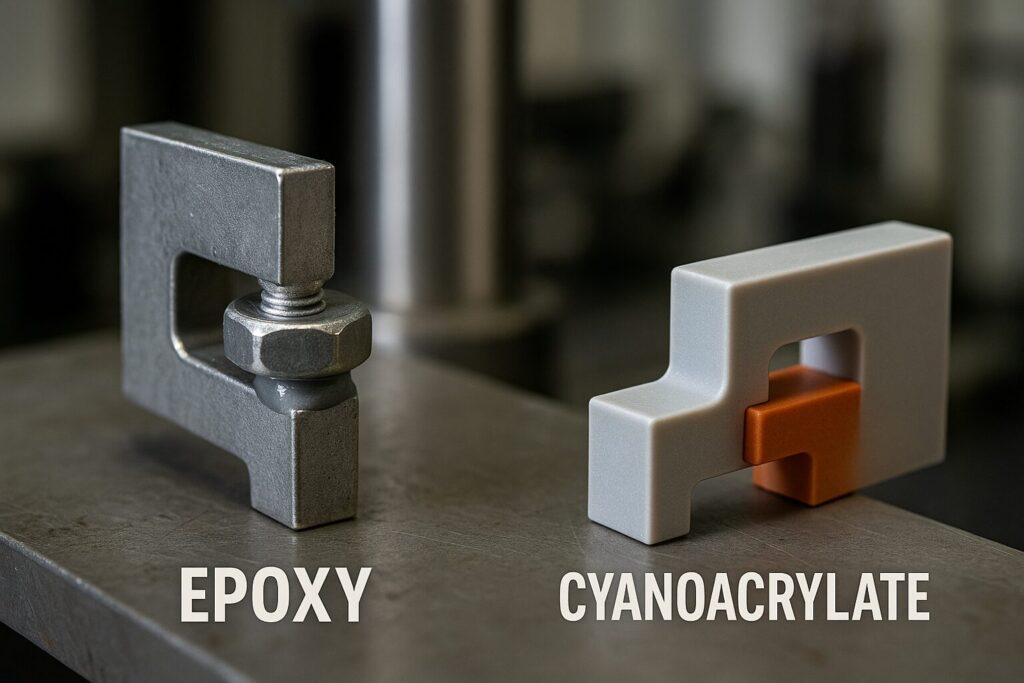Is epoxy glue stronger than cyanoacrylate? It’s a question professionals and DIYers alike often ask when choosing the best adhesive. While both glues offer fast and powerful bonding, they serve very different purposes depending on material, stress load, and application environment. This article compares the two based on strength, usage, and performance to help you make the right choice.
What Is the Difference Between Epoxy and Cyanoacrylate Adhesives?
Epoxy glue is a two-part adhesive made of resin and hardener, designed for structural bonding. Cyanoacrylate glue (super glue) is a single-component adhesive known for quick bonding and high initial tack.
Which One Has a Higher Bond Strength?
Epoxy generally offers higher bond strength than cyanoacrylate, especially for structural or load-bearing applications. Epoxy forms chemical bonds with surfaces and can withstand more force and environmental stress.
- Epoxy Tensile Strength: ~3,000–5,000 PSI
- Cyanoacrylate Tensile Strength: ~1,000–1,500 PSI
Epoxy glue is stronger than cyanoacrylate in most structural applications due to its superior bond strength and durability.

When Should You Use Epoxy Over Cyanoacrylate?
Use epoxy when:
- Bonding metal, wood, or ceramics in high-stress environments
- Filling gaps between uneven surfaces
- Working on projects needing water/heat resistance
Use cyanoacrylate when:
- You need an instant bond on small repairs
- Bonding smooth, clean surfaces like plastic, rubber, or skin
- Working in low-load applications
When Should You Use Epoxy Over Cyanoacrylate?
Use epoxy when:
- Bonding metal, wood, or ceramics in high-stress environments
- Filling gaps between uneven surfaces
- Working on projects needing water/heat resistance
Use cyanoacrylate when:
- You need an instant bond on small repairs
- Bonding smooth, clean surfaces like plastic, rubber, or skin
- Working in low-load applications
Is Epoxy Glue Waterproof Compared to Super Glue?
Yes. Epoxy adhesives typically offer superior water resistance, making them ideal for marine, outdoor, and plumbing applications. Most cyanoacrylates are water-resistant, but not waterproof under long-term exposure.
Is Epoxy Glue Stronger Than Cyanoacrylate for Long-Term Durability?
While both adhesives form solid bonds, epoxy is better suited for long-term applications due to its superior resistance to environmental stress, UV exposure, and aging. Unlike cyanoacrylate, which can become brittle over time, epoxy maintains its structural integrity for years. This makes it ideal for industrial, marine, and automotive uses where bond longevity is critical.
Which Materials Work Best with Each Adhesive?
Epoxy Bonds Well With:
- Metals (steel, aluminum)
- Ceramics and stone
- Wood and composites
- Glass
Cyanoacrylate Bonds Best With:
- Plastics (ABS, acrylic)
- Rubber
- Skin and soft materials
Final Words (Conclusion Section)
Choosing the right adhesive matters. While super glue (cyanoacrylate) is great for quick fixes and lightweight jobs, epoxy remains the stronger, more durable choice for heavy-duty, structural applications. If you’re bonding metal, filling gaps, or working in harsh environments, epoxy will outperform nearly every time.
FAQs
Is epoxy glue better than super glue?
Yes, epoxy is stronger and more durable than super glue for structural applications and heavy-duty repairs.
Can I use epoxy on plastic instead of super glue?
Yes, but cyanoacrylate often bonds plastic faster. Epoxy works better for structural plastic repairs.
Which glue dries faster—epoxy or cyanoacrylate?
Cyanoacrylate dries much faster, usually in seconds, while epoxy can take minutes to hours.
Is epoxy waterproof?
Yes, most epoxy glues are waterproof and ideal for outdoor and marine applications.
Which glue is safer for skin contact?
Cyanoacrylate is often used in medical-grade adhesives, but both should be used carefully to avoid skin contact.
